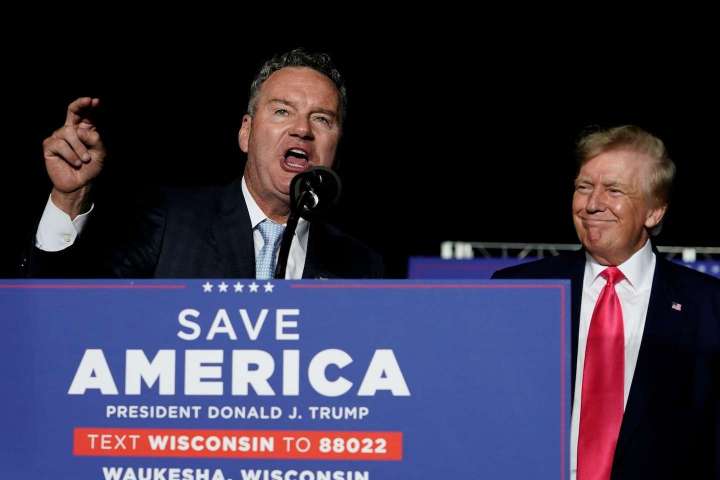The primary season is beginning to wind down, as voters in Connecticut, Minnesota, Vermont and Wisconsin held their nominating contests Tuesday, while Minnesota held a special election for a vacant congressional seat.
Takeaways from the Minnesota, Vermont and Wisconsin primaries

And plenty of eyes were fixed on a special congressional election in Minnesota on Tuesday — particularly in light of the handful of signs that things might not be quite so bad for Democrats in 2022, given the resurgence of President Biden’s agenda and as voters appear to be somewhat motivated to show up at the polls by the Supreme Court overturning Roe v. Wade.
A few weeks back, Democrats over-performed the fundamentals significantly in the first post-Roe special election in Nebraska, but you can’t extrapolate too much from one race.
Well, we now have a second post-Roe race, and Democrats have over-performed somewhat again — and by a pretty similar margin. Republican Brad Finstad led Democrat Jeff Ettinger by under 5 points in a district — Minnesota’s 1st — that Trump carried by 10 points in 2020.
As FiveThirtyEight notes, special congressional elections this cycle have been a very mixed bag — not quite showing the kind of consistent GOP over-performances you might expect in a very good Republican environment, while providing fodder for both sides to believe they might do well.
Republicans hailed their upset takeover of a Democratic-leaning South Texas seat in June, but the stakes were very low in a district that effectively won’t exist come January. The two specials since then show that the momentum hasn’t seemed to carry forward.
2. Trump’s showing in Wisconsin
Speaking of mixed bags, the primary season continues to be one for Donald Trump’s endorsements — albeit more positive than negative.
To be sure, Trump’s endorsed candidates win the vast majority of the time. But in actually competitive races, GOP primary voters have often gone a different direction.
And they went in different directions Tuesday in a pair of high-profile races in Wisconsin. Trump-endorsed businessman Tim Michels beat the early favorite, former lieutenant governor Rebecca Kleefisch, to face Gov. Tony Evers (D) in November. But Trump’s late effort to unseat state House Speaker Robin Vos (R) over Vos’s insufficient support for overturning Wisconsin’s election results failed. Vos narrowly led underfunded challenger Adam Steen and declared victory.
At the same time, the fact that a figure of Vos’s stature in the state GOP was so close to losing to such a challenger shows Trump’s influence. Trump didn’t get to defeat another state House speaker after doing it against Jan. 6 witness Rusty Bowers in Arizona last week, but a message has certainly been sent: Failing to sufficiently toe the Trump line on overturning elections on false pretenses will create problems for you. (Though notably, the dividing lines in the Wisconsin governor’s primary on this issue weren’t so stark.)
And if we’re focused just on the most closely decided 2020 states in which Trump has sought to send a message in the 2022 primaries, most of their state GOP’s have rallied to Trump’s candidates — most notably in Arizona, Michigan, Nevada, Pennsylvania and now perhaps more arguably Wisconsin. Georgia now appears very much the outlier.
(Side note: former vice president Mike Pence backed Kleefisch, meaning his endorsed candidates have now lost versus Trump-backed gubernatorial candidates in consecutive weeks in Arizona and Wisconsin, after Pence picked a resounding winner in Georgia Gov. Brian Kemp.)
3. Vermont’s late milestone for women
It has taken more than a century since Jeannette Rankin became the first woman to be elected to Congress in 1916 — and nearly 250 years since our nation’s founding — but it appears all 50 states will soon have sent at least one woman to Congress.
Vermont has been the lone holdout, but its Democrats on Tuesday nominated state Senate President Becca Balint for its at-large House seat. Balint, who defeated Lt. Gov. Molly Gray with ease, will still have to win the general election — against a male, GOP-nominated opponent — but should be heavily favored in a very blue state.
As the 19th recently summarized, Vermont is the last to take this step after Mississippi sent Cindy Hyde-Smith (R) to the Senate in 2018. Part of the reason for that is Vermont’s consistently small size — it’s had only one seat in Congress since the 1930s — as well as its very low turnover rate.
About 400 women in total have been sent to Congress since Rankin broke the gender barrier a century ago in Montana.






